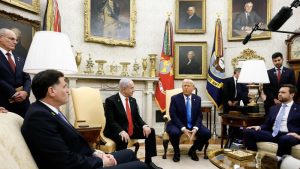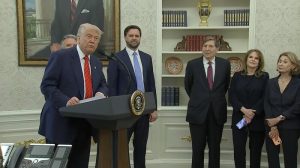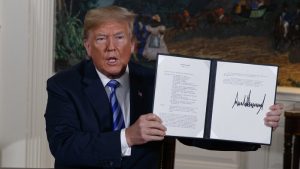PNN – Given Trump’s policies regarding regional developments during his second term as president, Israel is concerned that the US will no longer be a priority for its leaders in the region and that the regime’s position will be degraded.
According to the report of Pakistan News Network, Dr. Yoel Guzansky, former national security official and current head of the Persian Gulf department of the Israeli National Security Institute (INSS), pointed out the following regarding Trump’s upcoming trip to the region and the priorities on the agenda of the US President and the Gulf countries: The Zionist regime still has no place in the relations between Saudi Arabia and the United States and in decisions to increase relations.
This Zionist expert wrote in his report on this issue: President Trump’s much-anticipated trip to the Gulf states – primarily Saudi Arabia, Qatar and the United Arab Emirates – may be seen by the Trump administration as the first foreign policy achievement of its new presidency, but from Israel’s perspective, it is a worrying development, one that carries the potential to recede from its regional status and diminish its importance in the minds of Americans as a center of important strategic interests.
Trump has once again followed the same pattern that has characterized his relations with the Gulf States since his first term in office: Diplomacy with clear mutual interests – economic, security and technological – without liberal or democratic claims and demands.

He examines relations with the Persian Gulf countries through the lens of a “deal”: Arms in exchange for oil, investment in exchange for security protection, access to technology in exchange for geopolitical loyalty. The economic sector and commercial and military agreements between the United States and Arab countries are at the heart of the upcoming trip and meetings.
One of the most sensitive issues under discussion is Saudi Arabia’s plan for nuclear cooperation with the United States. Saudi Arabia is demanding recognition of its right to enrich uranium on its soil, a demand that derives legitimacy from the fact that Iran is also doing so.
Giving the US a green light for this could create a dangerous situation, both in terms of negotiations with Tehran and in terms of incentives for further nuclear technology expansion in the Middle East.
Also, the increasing demand for advanced technologies from Gulf States—including access to artificial intelligence, cyber systems, and advanced surveillance technologies—has created pressures on the United States to balance the desire to strengthen regional partnerships with the preservation of Israel’s qualitative military superiority (QME). This balance, which in the past was almost considered a red line in American security discourse, is now eroding and is no longer considered a red line.

The changing regional structure is clearly showing signs that Israel is gradually losing its unique position in the US political sphere. Although relations between Washington and Tel Aviv remain close at the security and intelligence levels, they appear to be increasingly strained in the political-diplomatic arena.
The issue of normalizing relations between Israel and Saudi Arabia, which was widely discussed under the previous administration, is almost entirely absent from the agenda of the current trip.
Furthermore, Saudi Arabia itself reportedly requested that the issue not be raised publicly, given the ongoing war in Gaza and the Israeli government’s stance of not discussing a political solution to the Israeli-Palestinian conflict. Saudi Arabia sees a two-state solution as a prerequisite for advancing relations with Israel. In this situation, there is no normalization agreement.
The US attitude towards Qatar also reflects its differences with Israel. Qatar, which has been the target of Israeli criticism for its ties to Hamas, currently enjoys the status of a strategic partner in Washington. These relations deepened during the Biden administration, and there is currently no indication that Trump is expected to want to change this situation. Quite the contrary, he is seeking to improve relations with Qatar.

If so, Israel is facing a new strategic reality, one that will reduce its influence in shaping US policy in the Middle East and weaken its position to that of a preferred actor. The closeness of US-Saudi relations, which is no longer conditional on Saudi Arabia’s willingness to get closer to Israel, is evidence of this.

